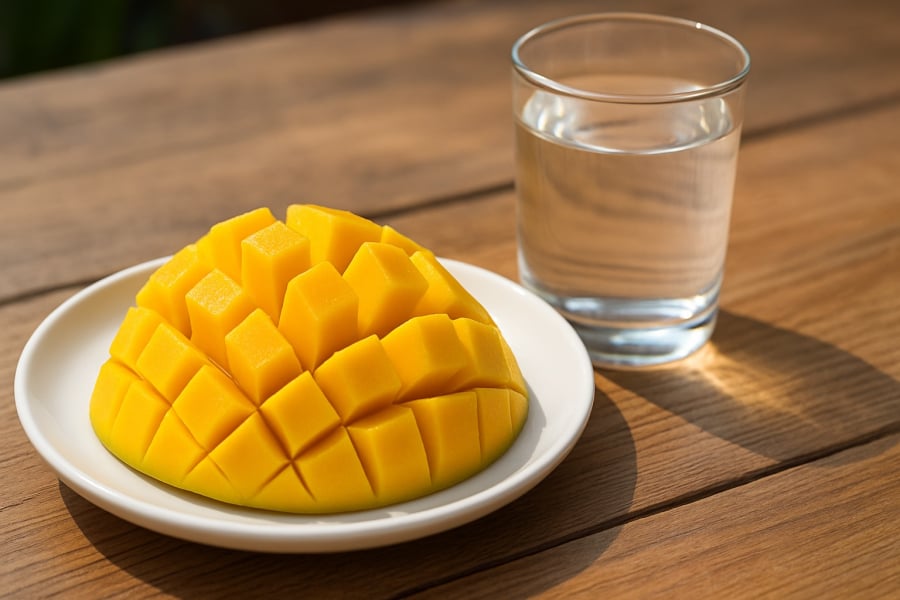Mango: The Sweet Summer Fruit with Surprising Health Benefits
High blood pressure and high cholesterol have long been known as silent killers, quietly increasing the risk of cardiovascular disease and stroke. According to the World Health Organization (WHO), millions of people worldwide die each year from these related conditions.
In this context, finding natural and easy-to-implement solutions to control blood pressure and cholesterol has always been a concern for health experts. A recent study by the University of California, published in the journal of the American Dietetic Association, has discovered that mangoes – the sweet fruit of summer – are indeed a wonderful companion for the heart.
Dr. Roberta Holt, a co-author of the study, shared: “We chose mangoes because they are nutrient-rich, containing fiber, antioxidants, and various bioactive compounds beneficial for cardiovascular health. Previously, some studies have shown that mangoes help regulate blood pressure and blood lipids, but this time we wanted to clarify the effects in postmenopausal women – those who are at a higher risk of cardiovascular disease.”

Study Reveals Surprising Benefits of Mangoes
The research was conducted on 24 women aged 50 to 70, all of whom were postmenopausal and struggled with being overweight or obese. For two weeks, each participant was asked to consume 330g of mango per day (equivalent to one large mango). Before and after the study, their blood pressure, cholesterol, and blood glucose levels were measured.
The results surprised the researchers:
- Natural blood pressure reduction: Just two hours after consuming mangoes, the average systolic blood pressure of the participants decreased by about 6 mmHg, while the diastolic blood pressure decreased by 2.3 mmHg. Dr. Robert Hackman, a co-author of the study, stated: “Although the reduction seems small, in the long run, it contributes to lowering the risk of cardiovascular disease and stroke.”
- Cholesterol control: The participants also observed a decrease of approximately 13 points in total cholesterol and LDL (bad) cholesterol. According to Dr. Holt: “This is an encouraging result, especially since it was achieved in just two weeks. It suggests that eating mangoes could be a simple and tasty way to help manage cholesterol levels, especially in postmenopausal women.”
- Stable blood glucose levels: Mangoes also helped slow the rise in blood sugar levels compared to eating white bread. This is due to the fiber and bioactive compounds in mangoes that slow down the absorption of sugar. Dr. Holt emphasized: “Good blood glucose control is crucial to preventing insulin resistance, one of the causes of type 2 diabetes.”

Incorporating Mangoes into Your Daily Diet: Tips for Optimal Benefits
Commenting on the study, Dr. Lauri Wright – Director of the Public Health Program at the University of South Florida (USF) – who was not directly involved, also stated: “This is an intriguing study. Mangoes are already renowned for their antioxidants and fiber content, and now they are proven to support cardiovascular health. However, it’s important to remember that mangoes should be enjoyed as part of a diverse, balanced diet rich in fruits, vegetables, and whole foods.”
Therefore, to maximize the benefits of mangoes, consider the following tips:
- Combine mangoes with oatmeal or yogurt for breakfast to boost your fiber and probiotic intake.
- Use mangoes as a natural dessert instead of sugary cakes and ice cream.
- Add mangoes to your salads or smoothies to diversify your meals while boosting their nutritional value.
It’s important to note that while mangoes are nutritious, excessive consumption (more than one mango per day) is not recommended, especially for those with a history of diabetes. Maintaining a healthy lifestyle – including a balanced diet, regular exercise, and routine health check-ups – remains the key to long-term cardiovascular health.
In Conclusion: A Mango a Day Keeps the Heart Doctor Away
Mangoes – a fruit that seems like a simple summer treat – turn out to be a treasure trove of heart-healthy benefits. For those seeking a natural and accessible way to support their blood pressure and cholesterol levels, why not try incorporating a mango into your daily diet?
Củ Nưa: The Exotic Delicacy Taking the City by Storm at 250,000 VND per kg.
In the hustle and bustle of modern life, city dwellers are constantly on the lookout for culinary delights that not only tantalize their taste buds but also nourish their bodies. Enter the humble Nưa root, a once-obscure vegetable that is now taking the culinary world by storm, with prices soaring to 250,000 VND per kilogram.
How Many Calories Are in Mangoes? Can Eating Mangoes Make You Fat?
Mangoes: A Nutritious Delight or a Weight-Loss Wonder?
Mangoes are often touted as a delicious, nutrient-rich fruit with potential weight-loss benefits. But is this true? Can mangoes really be a sweet treat that helps keep the pounds off? It’s time to uncover the truth behind this tropical fruit’s reputation and explore whether mangoes are a dieter’s friend or foe.





































